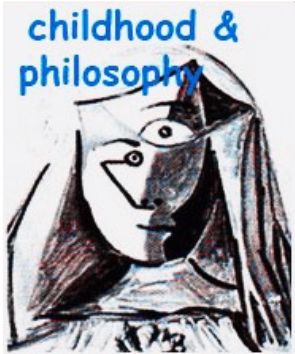what are we missing? voice and listening as an event
DOI:
https://doi.org/10.12957/childphilo.2023.70451Keywords:
voice, listening, childhood, event, community of philosophical inquiryAbstract
The paper begins with the concept of voice and questions its different meanings, especially in educational settings, to propose a philosophical framing of people-of-young-age’s material voices. It then proposes to understand those voices as disruptive differences or opportunities to (re)think about our roles as educators and, most of all, to return to the question of what a philosophical approach to childhood might disrupt. In doing so, it outlines some ideas about “voice” as sound and materiality (Cavarero, 2005) and also about “listening” as a permanent attention to what might emerge (Nancy, 2002; Davies, 2014), to then extend particular meanings of these concepts to the practice of thinking philosophically with people of different ages in the community of philosophical inquiry educational setting (Kennedy & Kennedy, 2012). It also builds on the concept of “event” by Gilles Deleuze (Deleuze, 2013), as a potential immanent within a confluence of forces, to then ask how we can foster a philosophical way of living (in) education that takes people-of-young-age’s material voices as something we cannot afford to lose. Finally, the paper proposes to frame the community of philosophical inquiry as a philosophical community of voices, in the sense of an opportunity to experience the materiality of all the voices as something that matters in the shared thought of its participants.
Downloads
References
Author, A. (2019)
Bezerra, I. R. (2021). Desconstrução da metafísica em vozes plurais, de Adriana Cavarero, Anuário de Literatura, 26 http://doi.org/10.5007/2175-7917.2021.e72079
Calvino, I. (1988). Under the jaguar sun. San Diego: Harcourt Brace Jovanovichs.
Cavarero, A. (2005). For more than one voice. Toward a philosophy of vocal expression. Stanford: Stanford University Press.
Davies, B. (2014). Listening to children. Being and becoming. New York: Routledge.
Foucault, M. (1977). Los intelectuales y el poder. Entrevista Michel Foucault-Gilles Deleuze. In Microfísica del poder. Madrid: Las Ediciones de la Piqueta, pp. 77-86.
Deleuze, G. (2013). Logique du sens. Paris: Les Éditions du Minuit.
Deleuze, G., & Guattari, F. (2007). Mil Planaltos: capitalismo e esquizofrenia. Lisboa: Assírio Alvim
Edwards, C., Gandini, L., & Forman, G., (1993). The one hundred languages of children: the Reggio Emilia experience in transformation. California: Praeger.
Elicor, Peter Paul (2020). mapping identity prejudice: locations of epistemic injustice in philosophy for/with children. childhood & philosophy, 16, pp. 1-24.
Fricker, M. (2007). Epistemic injustice: Power and the ethics of knowing. Oxford: Oxford University Press.
Haraway, D. (2007). When species meet. Minnesota: University Press.
Jasinski, I., & Lewis, T. (2016). Community of Infancy: Suspending the Sovereignty of the Teacher’s Voice. Journal of Philosophy of Education 50 (4): 538-553.
Johansson, V. (2021). Sa’mi children as thought herders: philosophy of death and storytelling as radical hope in early childhood education. Special Issue: Fiction and Truth, Learning and Literature: Interdisciplinary Perspectives. DOI: 10.1177/14782103211031413
Kennedy, N.; Kennedy, D. (2012). “Community of Philosophical Inquiry as a Discoursive Structure, and its Role in School Curriculum Design”. In Philosophy for Children in Transition: Problems and Prospects, ed. Nancy Vansieleghem and David Kennedy, London: Blackwell, p. 97-116.
Nishiyama, K. (2020). Between protection and participation: Rethinking children’s rights to participate in protests on streets, online spaces, and schools. Journal of Human Rights, https://doi.org/10.1080/14754835.2020.1783523.
Lundy, L. (2007). ‘Voice’ is not enough: conceptualizing Article 12 of the United Nations Convention on the Rights of the Child. British Educational Research Journal, 33 (6), pp. 927–942.
Mello, M; Lopes, J; Lima, M. (2021). Porque rimos das crianças?. Linhas Críticas. Dossiê: Participaciones y resistencias de las infancias y juventudes de América Latina. doi.org/10.26512/lc27202135191
Murris, K. (2020). The ‘Missing Peoples’ of critical posthumanism and new materialism. In Navigating the Postqualitative, New Materialist and Critical Posthumanist Terrain Across Disciplines. London: Routledge, p. 62-84.
Nancy, J.-L. (2002). À l’écoute. Paris: Éditions Galilée.
Rollo T (2020) “Democratic Child’s Play. Natality, Responsible Education, and Decolonial Praxis”. In Thinking, Childhood, and Time. Contemporary Perspectives on the Politics of Education, eds. Walter Omar Kohan and Barbara Weber, London: Lexington Books, pp. 145-160.



